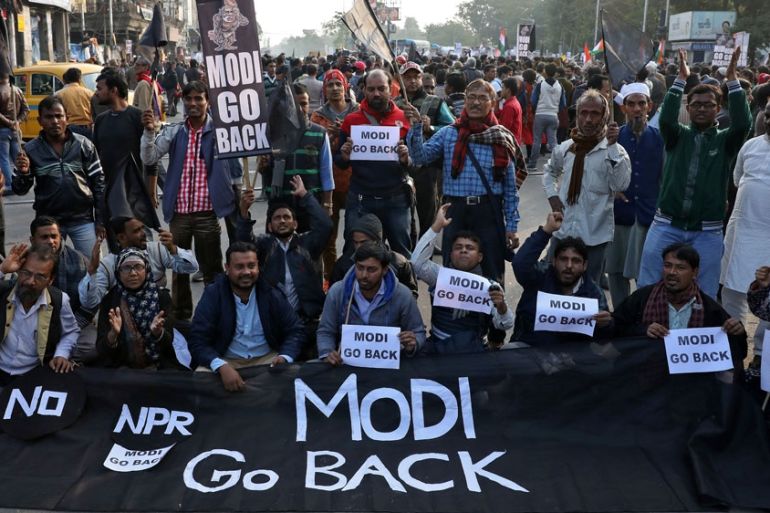‘Go back Modi’: India protesters condemn PM’s visit to Kolkata
Nearly 30,000 protesters take to megacity’s streets to denounce Modi’s visit and oppose a new citizenship law.

Thousands of angry protesters took to the streets to tell India’s leader he was unwelcome in the eastern city of Kolkata, in the latest rally against a citizenship law that critics say discriminates against Muslims.
Widespread street demonstrations, and occasionally deadly clashes, have gripped the Hindu-majority South Asian nation since the Citizenship Amendment Act (CAA) was passed by Parliament last month.
Keep reading
list of 3 itemsIndia’s JNU attacked: ‘We thought … we all will lose our lives’
What’s going on in Kashmir? | Start Here
Police said nearly 30,000 protesters took to the streets of Kolkata on Saturday to denounce Prime Minister Narendra Modi‘s visit, with many linking hands to form human chains that spanned miles through the streets of the megacity.
A crowd mobbed the city’s airport and chanted “we are against fascism” and carried placards that said: “Go back Modi.”

“What we are fighting for is the future of India,” Surita Roy, a woman who joined the rally, told AFP news agency.
Modi’s plane touched down before he transferred to a military helicopter that carried him to the house of West Bengal state leader Mamata Banerjee – a vocal critic of Modi’s ruling Hindu nationalist government.
Police stopped protesters from following Modi to the chief minister’s house, but Banerjee told journalists after their meeting that she had asked him to repeal the law “for the larger interests of the country” and then joined the street protests herself.
The CAA eases the path for non-Muslim minorities from the neighbouring Muslim-majority nations of Afghanistan, Bangladesh and Pakistan to gain Indian citizenship.
Critics say the law is a precursor to a National Register of Citizens (NRC) that many among India’s 200 million Muslims – about 15 percent of the country’s population – fear will leave them stateless.
Besides, many poor Indians also say they do not have the documents to prove their nationality.
Modi has, in turn, accused his political opponents of “misleading” and “inciting” people against his government.
His party has launched a door-to-door campaign in a bid to dispel “misinformation” about the law, which they insist is not discriminatory.
At least 27 people, mostly Muslims, have died during the protests after the demonstrators defied police restrictions in several states of the country.
But hundreds of thousands of protesters have continued to meet the public across the country and demand a rollback of the contentious law.